Kenneth Atchity's Blog, page 206
July 12, 2013
Steven Spielberg Predicts 'Implosion' of Film Industry

George Lucas echoed Spielberg's sentiments at an event touting the opening of a new USC School of Cinematic Arts building, saying big changes are in store.
Steven Spielberg on Wednesday predicted an "implosion" in the film industry is inevitable, whereby a half dozen or so $250 million movies flop at the box office and alter the industry forever. What comes next -- or even before then -- will be price variances at movie theaters, where "you're gonna have to pay $25 for the next Iron Man, you're probably only going to have to pay $7 to see Lincoln." He also said that Lincoln came "this close" to being an HBO movie instead of a theatrical release.
our editor recommends
George Lucas agreed that massive changes are afoot, including film exhibition morphing somewhat into a Broadway play model, whereby fewer movies are released, they stay in theaters for a year and ticket prices are much higher. His prediction prompted Spielberg to recall that his 1982 film E.T. the Extra-Terrestrial stayed in theaters for a year and four months.
The two legendary filmmakers, along with CNBC anchor Julia Boorstin and Microsoft president of interactive entertainment business Don Mattrick, were speaking at the University of Southern California as part of the festivities surrounding the official opening of the Interactive Media Building, three stories high and part of the USC School of Cinematic Arts.
Lucas and Spielberg told USC students that they are learning about the industry at an extraordinary time of upheaval, where even proven talents find it difficult to get movies into theaters. Some ideas from young filmmakers "are too fringe-y for the movies," Spielberg said. "That's the big danger, and there's eventually going to be an implosion — or a big meltdown. There's going to be an implosion where three or four or maybe even a half-dozen megabudget movies are going to go crashing into the ground, and that's going to change the paradigm."
Lucas lamented the high cost of marketing movies and the urge to make them for the masses while ignoring niche audiences. He called cable television "much more adventurous" than film nowadays.
"I think eventually the Lincolns will go away and they're going to be on television," Lucas said. "As mine almost was," Spielberg interjected. "This close -- ask HBO -- this close."
"We're talking Lincoln and Red Tails -- we barely got them into theaters. You're talking about Steven Spielberg and George Lucas can't get their movie into a theater," Lucas said. "I got more people into Lincoln than you got into Red Tails," Spielberg joked.
Spielberg added that he had to co-own his own studio in order to get Lincoln into theaters.
"The pathway to get into theaters is really getting smaller and smaller," Lucas said.
Mattrick and Spielberg also praised Netflix, prompting Boorstin to ask Spielberg if he planned to make original content for the Internet streamer. "I have nothing to announce," said the director.
Lucas and Spielberg also spoke of vast differences between filmmaking and video games because the latter hasn't been able to tell stories and make consumers care about the characters. Which isn't to say the two worlds aren't connected. Spielberg, in fact, has teamed with Microsoft to make a "TV" show for Xbox 360 based on the game Halo and he is making a movie based on the Electronic Arts game Need for Speed.
Reposted from: HollywoodReporter.com

Published on July 12, 2013 00:00
July 9, 2013
By Kyle Stock
Producer Jerry Bruckheimer, ...
By Kyle Stock

Producer Jerry Bruckheimer, director Gore Verbinski and actors Saginaw
Grant and Johnny Depp attend The World Premiere of Disney/Jerry
Bruckheimer Films' 'The Lone Ranger' at Disney California Adventure Park
Here’s the recipe for making a summer blockbuster: Buy a proven franchise, lock down one of the most coveted release dates of the year, and spare no expense to get an A-list actor, producer, and director. Unfortunately for studio executives, that’s also the recipe for a flop, as the team behind Walt Disney’s (DIS)The Lone Ranger is realizing all too clearly this morning.
The highly anticipated film didn’t even take in $30 million in theaters this weekend, which is pretty low considering the spectacle’s $225 million budget—a sum no doubt inflated by Johnny Depp, star producer Jerry Bruckheimer, and award-winning director Gore Verbinski. It’s as if the Miami Heat spent lavishly on its three marquee athletes and failed to make the playoffs. Based on an 80-year-old radio series, the film failed to draw young viewers, didn’t impress critics, and may have a tough slog at theaters outside the U.S., given its Wild West setting.
“That’s particularly frustrating given the time, energy, and cost, and when it feels like you have the ingredients to succeed,” says Dave Hollis, executive vice president for sales and distribution at Disney.
In the weird accounting of the entertainment industry, the cost of making a film is marked as an asset. A big paycheck for a star such as Johnny Depp goes on the balance sheet right next to real estate holdings. When it looks like those investments won’t pay off, the company is forced to take a writedown, such as the $200 million lump Disney took on John Carter early last year.
Disney says it is too early—even “reckless”—to be discussing a writedown on The Lone Ranger, but it already has a pretty good idea of how much money it will lose (or gain) on the film. Based on how past films have performed, studios use early box office results to estimate each subsequent window of revenue: the rest of the film’s run in theatres, DVD, and video-on-demand sales, revenue from paid-TV outlets such as HBO, and finally cable and broadcast networks buying the rights to show the film.
Wall Street analysts, meanwhile, are doing the same thing. Lazard Capital’s Barton Crockett says Disney might take a $190 million writedown on the film. A Cowen & Co. analyst puts the loss at $150 million, according to The Hollywood Reporter.
Bloomberg Industries analyst Paul Sweeney says Disney will know its final return on The Lone Ranger in the next couple of weeks, though he doesn’t think a writedown will be announced before the company’s next earnings release on Aug. 6.
So why does Disney take such big gambles on major motion pictures? Because the payoff can be enormous, and it can afford to take its chances. Studio entertainment made up just 13 percent of Disney revenue last quarter and less than 5 percent of its operating income. Most of Disney’s business these days comes from its TV properties, including an 80 percent stake in ESPN, followed by its parks and resorts.
If Disney’s studio executives green-light a massive hit such as its seminal Pirates of the Caribbean, they trigger a lucrative chain of sequels, toy sales, and amusement park rides. If they roll out a stinker like John Carter, the flop virtually disappears on financial statements.
Disney may write down more than $100 million on The Lone Ranger, but it still has almost $5 billion of film and TV costs listed as assets on its recent financial statements.
“It’s a hit or miss business,” Sweeney says. “One year you’re going to have Titanic, and the next year you’re not.”
Stock is an associate editor for Businessweek.com.
Reposted from http://www.businessweek.com/

Producer Jerry Bruckheimer, director Gore Verbinski and actors Saginaw
Grant and Johnny Depp attend The World Premiere of Disney/Jerry
Bruckheimer Films' 'The Lone Ranger' at Disney California Adventure Park
Here’s the recipe for making a summer blockbuster: Buy a proven franchise, lock down one of the most coveted release dates of the year, and spare no expense to get an A-list actor, producer, and director. Unfortunately for studio executives, that’s also the recipe for a flop, as the team behind Walt Disney’s (DIS)The Lone Ranger is realizing all too clearly this morning.
The highly anticipated film didn’t even take in $30 million in theaters this weekend, which is pretty low considering the spectacle’s $225 million budget—a sum no doubt inflated by Johnny Depp, star producer Jerry Bruckheimer, and award-winning director Gore Verbinski. It’s as if the Miami Heat spent lavishly on its three marquee athletes and failed to make the playoffs. Based on an 80-year-old radio series, the film failed to draw young viewers, didn’t impress critics, and may have a tough slog at theaters outside the U.S., given its Wild West setting.
“That’s particularly frustrating given the time, energy, and cost, and when it feels like you have the ingredients to succeed,” says Dave Hollis, executive vice president for sales and distribution at Disney.
In the weird accounting of the entertainment industry, the cost of making a film is marked as an asset. A big paycheck for a star such as Johnny Depp goes on the balance sheet right next to real estate holdings. When it looks like those investments won’t pay off, the company is forced to take a writedown, such as the $200 million lump Disney took on John Carter early last year.
Disney says it is too early—even “reckless”—to be discussing a writedown on The Lone Ranger, but it already has a pretty good idea of how much money it will lose (or gain) on the film. Based on how past films have performed, studios use early box office results to estimate each subsequent window of revenue: the rest of the film’s run in theatres, DVD, and video-on-demand sales, revenue from paid-TV outlets such as HBO, and finally cable and broadcast networks buying the rights to show the film.
Wall Street analysts, meanwhile, are doing the same thing. Lazard Capital’s Barton Crockett says Disney might take a $190 million writedown on the film. A Cowen & Co. analyst puts the loss at $150 million, according to The Hollywood Reporter.
Bloomberg Industries analyst Paul Sweeney says Disney will know its final return on The Lone Ranger in the next couple of weeks, though he doesn’t think a writedown will be announced before the company’s next earnings release on Aug. 6.
So why does Disney take such big gambles on major motion pictures? Because the payoff can be enormous, and it can afford to take its chances. Studio entertainment made up just 13 percent of Disney revenue last quarter and less than 5 percent of its operating income. Most of Disney’s business these days comes from its TV properties, including an 80 percent stake in ESPN, followed by its parks and resorts.
If Disney’s studio executives green-light a massive hit such as its seminal Pirates of the Caribbean, they trigger a lucrative chain of sequels, toy sales, and amusement park rides. If they roll out a stinker like John Carter, the flop virtually disappears on financial statements.
Disney may write down more than $100 million on The Lone Ranger, but it still has almost $5 billion of film and TV costs listed as assets on its recent financial statements.
“It’s a hit or miss business,” Sweeney says. “One year you’re going to have Titanic, and the next year you’re not.”
Stock is an associate editor for Businessweek.com.
Reposted from http://www.businessweek.com/

Published on July 09, 2013 00:00
July 8, 2013
Wordbasket Reviews Nobody Walks
L.A. Confutational
Dennis M. Walsh, Nobody Walks: Bringing My Brother's Killers to Justice
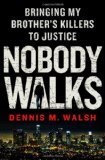 In
In
July 2003, two Los Angeles hoodlums shot tweaker Christopher Walsh in
the head, stuffed his body in a plastic garbage barrel, and stowed his
remains in a Van Nuys storage unit. His brother, defense attorney Dennis
Walsh, swore vengeance on LA’s criminal underground, telling anybody
who would listen, “Nobody walks on this case.” Little did he know he’d
become the biggest scourge on the underworld since Charles Bronson.
Dennis Walsh tells his own story with the kinetic aggression that drives
filmmakers like Scorsese and Tarantino. His brash, violent, gleefully
profane narrative never lags, leaving readers feeling like they’ve been
pummeled by a true master pummeler. And while his cast of thousands may
demand intense attention to keep names straight (keep notes on the
endpaper), his story of realistic sublegal crime fighting makes CSI look
wimpy by comparison.
Walsh’s father was a Cleveland PD detective who got rich working the
other side. A one-time rising star of California’s Irish mob, he led his
many sons into “the life.” The only Walsh without a record, Dennis did a
hitch in the Navy, completed his law degree, and went into private
practice, keeping bottom-feeders out of the hoosegow. This strange dual
life made him perfect to nvestigate crimes where police cannot venture.
Christopher Walsh, Dennis’ youngest brother, drifted through life, got
hooked on meth, and spent his final days among tweakers who’d
surrendered normal humanity. Nobody heard from him for weeks before his
remains surfaced. Seems tweakers don’t interact outside their circle,
even when somebody has to clean up the blood. Even less when it means
talking to the police: everybody knew who killed Christopher, but nobody
would sing for the LAPD.
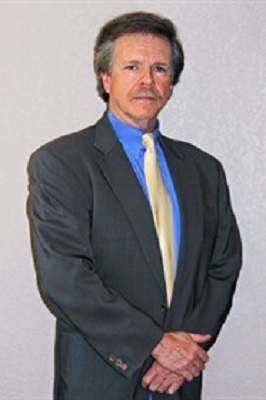 An
An
an attorney with longstanding underground connections, Dennis stood in a
unique position to haunt his brother’s killers. In his trademark
Cleveland Indians ballcap and jeans, he infiltrated California’s insular
meth-head community; with his brother Tim at his side, tweakers began
saying “the Walsh Brothers” like you might say “Sinn Fein.” But his
sharp suits and avuncular silver curls gave him unique access to
California’s byzantine legal system, too.
Walsh tells a gripping story, shifting between Wild West vigilante
heroics among an essentially lawless community, and the tense
compromises necessary from an officer of the courts. One moment, Walsh
and his brothers may serve a beat-down on some Valley scum-sucker to nab
new leads. The next, he walks careful lines in the LA criminal court,
perennially trying to stay on deputy DA Stephanie Sparagna's good side.
While Walsh remains the hero of his story—dude, meth-heads shot his
brother in the face—he doesn’t flinch from his ad hoc morality. As an
unwanted guest in a community with no law and little order, he often has
no choice but to solve problems with his fists and lie to his allies.
When the LAPD proves ill-equipped for Christopher’s case, Dennis
helpfully offers to distribute old-fashioned street justice.
Eventually, evidence in Christopher’s murder crisscrosses LA County,
transcends economic class, and overlaps California’s many criminal
subcultures. Arresting Christopher’s killers requires Faustian bargains,
impromptu partnerships, and elaborate knife-edge dances between law
enforcement agencies. When his drug-addled chief witness makes a deal
with the US Marshals but has an LAPD warrant on his ass, Dennis uncorks
diplomacy worthy of Churchill at Yalta.
Even when the cops have Christopher’s killers behind bars, Dennis’s journey isn’t over. On Law & Order,
everything looks so neat: 24 minutes for arrest, 24 minutes for trial,
and by the credits, they (almost) always have the guilty party in
chains. Not so, says Walsh: enterprising defendants can impede the legal
process for years, while witnesses age, memories fade, and evidence
languishes. Christopher’s killers prove astute heel-draggers.
Nothing
proves easy in this story. While working both the courts and the
criminal underworld, Dennis must also control his criminal brothers,
keep his sources from discovering one another, and remain a viable
vigilante after everyone treats him like Batman. He never recovers the
murder weapon. It may be in the concrete foundations of actor Ving
Rhames’s house, demonstrating how this case binds SoCal glamour with
postmodern urban decay.
Not everyone will like this story. Walsh’s intense, meteoric narrative
requires acute attention, especially since he compresses events that
actually occured some time and distance apart. His raunchy prose may
bother some readers, particularly his frequent f-bombs and casual
violence. But Walsh’s deeply cinematic story, bolstered by heartfelt
investment in events over a decade later, gives him distinct power. This
stark, unforgiving story won’t leave you easily.

Dennis M. Walsh, Nobody Walks: Bringing My Brother's Killers to Justice
 In
InJuly 2003, two Los Angeles hoodlums shot tweaker Christopher Walsh in
the head, stuffed his body in a plastic garbage barrel, and stowed his
remains in a Van Nuys storage unit. His brother, defense attorney Dennis
Walsh, swore vengeance on LA’s criminal underground, telling anybody
who would listen, “Nobody walks on this case.” Little did he know he’d
become the biggest scourge on the underworld since Charles Bronson.
Dennis Walsh tells his own story with the kinetic aggression that drives
filmmakers like Scorsese and Tarantino. His brash, violent, gleefully
profane narrative never lags, leaving readers feeling like they’ve been
pummeled by a true master pummeler. And while his cast of thousands may
demand intense attention to keep names straight (keep notes on the
endpaper), his story of realistic sublegal crime fighting makes CSI look
wimpy by comparison.
Walsh’s father was a Cleveland PD detective who got rich working the
other side. A one-time rising star of California’s Irish mob, he led his
many sons into “the life.” The only Walsh without a record, Dennis did a
hitch in the Navy, completed his law degree, and went into private
practice, keeping bottom-feeders out of the hoosegow. This strange dual
life made him perfect to nvestigate crimes where police cannot venture.
Christopher Walsh, Dennis’ youngest brother, drifted through life, got
hooked on meth, and spent his final days among tweakers who’d
surrendered normal humanity. Nobody heard from him for weeks before his
remains surfaced. Seems tweakers don’t interact outside their circle,
even when somebody has to clean up the blood. Even less when it means
talking to the police: everybody knew who killed Christopher, but nobody
would sing for the LAPD.
 An
Anan attorney with longstanding underground connections, Dennis stood in a
unique position to haunt his brother’s killers. In his trademark
Cleveland Indians ballcap and jeans, he infiltrated California’s insular
meth-head community; with his brother Tim at his side, tweakers began
saying “the Walsh Brothers” like you might say “Sinn Fein.” But his
sharp suits and avuncular silver curls gave him unique access to
California’s byzantine legal system, too.
Walsh tells a gripping story, shifting between Wild West vigilante
heroics among an essentially lawless community, and the tense
compromises necessary from an officer of the courts. One moment, Walsh
and his brothers may serve a beat-down on some Valley scum-sucker to nab
new leads. The next, he walks careful lines in the LA criminal court,
perennially trying to stay on deputy DA Stephanie Sparagna's good side.
While Walsh remains the hero of his story—dude, meth-heads shot his
brother in the face—he doesn’t flinch from his ad hoc morality. As an
unwanted guest in a community with no law and little order, he often has
no choice but to solve problems with his fists and lie to his allies.
When the LAPD proves ill-equipped for Christopher’s case, Dennis
helpfully offers to distribute old-fashioned street justice.
Eventually, evidence in Christopher’s murder crisscrosses LA County,
transcends economic class, and overlaps California’s many criminal
subcultures. Arresting Christopher’s killers requires Faustian bargains,
impromptu partnerships, and elaborate knife-edge dances between law
enforcement agencies. When his drug-addled chief witness makes a deal
with the US Marshals but has an LAPD warrant on his ass, Dennis uncorks
diplomacy worthy of Churchill at Yalta.
Even when the cops have Christopher’s killers behind bars, Dennis’s journey isn’t over. On Law & Order,
everything looks so neat: 24 minutes for arrest, 24 minutes for trial,
and by the credits, they (almost) always have the guilty party in
chains. Not so, says Walsh: enterprising defendants can impede the legal
process for years, while witnesses age, memories fade, and evidence
languishes. Christopher’s killers prove astute heel-draggers.
Nothing
proves easy in this story. While working both the courts and the
criminal underworld, Dennis must also control his criminal brothers,
keep his sources from discovering one another, and remain a viable
vigilante after everyone treats him like Batman. He never recovers the
murder weapon. It may be in the concrete foundations of actor Ving
Rhames’s house, demonstrating how this case binds SoCal glamour with
postmodern urban decay.
Not everyone will like this story. Walsh’s intense, meteoric narrative
requires acute attention, especially since he compresses events that
actually occured some time and distance apart. His raunchy prose may
bother some readers, particularly his frequent f-bombs and casual
violence. But Walsh’s deeply cinematic story, bolstered by heartfelt
investment in events over a decade later, gives him distinct power. This
stark, unforgiving story won’t leave you easily.

Published on July 08, 2013 00:00
July 6, 2013
The Messiah Matrix
Published on July 06, 2013 00:00
July 5, 2013
Steven Spielberg Predicts 'Implosion' of Film Industry

George Lucas echoed Spielberg's sentiments at an event touting the opening of a new USC School of Cinematic Arts building, saying big changes are in store.
Steven Spielberg on Wednesday predicted an "implosion" in the film industry is inevitable, whereby a half dozen or so $250 million movies flop at the box office and alter the industry forever. What comes next -- or even before then -- will be price variances at movie theaters, where "you're gonna have to pay $25 for the next Iron Man, you're probably only going to have to pay $7 to see Lincoln." He also said that Lincoln came "this close" to being an HBO movie instead of a theatrical release.
our editor recommends
George Lucas agreed that massive changes are afoot, including film exhibition morphing somewhat into a Broadway play model, whereby fewer movies are released, they stay in theaters for a year and ticket prices are much higher. His prediction prompted Spielberg to recall that his 1982 film E.T. the Extra-Terrestrial stayed in theaters for a year and four months.
The two legendary filmmakers, along with CNBC anchor Julia Boorstin and Microsoft president of interactive entertainment business Don Mattrick, were speaking at the University of Southern California as part of the festivities surrounding the official opening of the Interactive Media Building, three stories high and part of the USC School of Cinematic Arts.
Lucas and Spielberg told USC students that they are learning about the industry at an extraordinary time of upheaval, where even proven talents find it difficult to get movies into theaters. Some ideas from young filmmakers "are too fringe-y for the movies," Spielberg said. "That's the big danger, and there's eventually going to be an implosion — or a big meltdown. There's going to be an implosion where three or four or maybe even a half-dozen megabudget movies are going to go crashing into the ground, and that's going to change the paradigm."
Lucas lamented the high cost of marketing movies and the urge to make them for the masses while ignoring niche audiences. He called cable television "much more adventurous" than film nowadays.
"I think eventually the Lincolns will go away and they're going to be on television," Lucas said. "As mine almost was," Spielberg interjected. "This close -- ask HBO -- this close."
"We're talking Lincoln and Red Tails -- we barely got them into theaters. You're talking about Steven Spielberg and George Lucas can't get their movie into a theater," Lucas said. "I got more people into Lincoln than you got into Red Tails," Spielberg joked.
Spielberg added that he had to co-own his own studio in order to get Lincoln into theaters.
"The pathway to get into theaters is really getting smaller and smaller," Lucas said.
Mattrick and Spielberg also praised Netflix, prompting Boorstin to ask Spielberg if he planned to make original content for the Internet streamer. "I have nothing to announce," said the director.
Lucas and Spielberg also spoke of vast differences between filmmaking and video games because the latter hasn't been able to tell stories and make consumers care about the characters. Which isn't to say the two worlds aren't connected. Spielberg, in fact, has teamed with Microsoft to make a "TV" show for Xbox 360 based on the game Halo and he is making a movie based on the Electronic Arts game Need for Speed.
Reposted from: HollywoodReporter.com

Published on July 05, 2013 00:00
Guest Post: Words of Wisdom (Hollywood Edition) by Dennis Palumbo
Hollywood on the Couch
The inside scoop on Tinseltown, USA.
by Dennis Palumbo
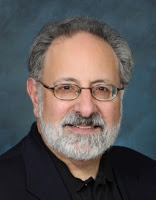
My favorite quotes to inspire creativity
During my many years spent as a Hollywood screenwriter, and now during my even longer tenure as a psychotherapist who treats people in the entertainment industry, I’ve come across a number of inspirational quotes concerning the creative act. Though usually short, often humorous or frankly rueful, the wisdom underlying these quotes derives from the long years of sweat, blood and tears that obviously gave rise to them.
Whether you're a writer, actor, director, composer or designer—and whether you're a veteran or just starting your career—I believe there's much to value in the sayings below. Proving once again that truth, like so many other things, often comes in small packages.
“In the beginner’s mind, there are many possibilities; in the expert’s mind, there are few.”
Shunryu Suzuki
“All serious daring starts from within.” Eudora Welty
“Faith and doubt, both are needed, not as antagonists but working side by side, to take us around the unknown curve.” Lillian Smith
“How do I work? I grope.” Albert Einstein
“To believe that what is true for you in your private heart is true for everyone—that is genius.”
Ralph Waldo Emerson
“I work when I’m inspired, and I see to it that I’m inspired at nine o’clock every morning.”
Peter De Vries
“There is only one type of story in the world—your story.” Ray Bradbury
“I have known happiness, for I have done good work.” Robert Louis Stevenson
“Traveler, there is no path. Paths are made by walking.” Antonio Machado
“Only the disciplined are free.” James C. Penney
“Mistakes are the portals of discovery.” James Joyce
“Plainly speaking, there is no such thing as certainty. There are only people who are certain.”
Charles Levourier
“It is not your obligation to complete your work, but you are not at liberty to quit.”
The Talmud
“When the last dime is gone, I’ll sit out on the curb with a pencil and a ten-cent notebook, and start the whole thing all over again.” Preston Sturges
“I yam what I yam.” Popeye

The inside scoop on Tinseltown, USA.
by Dennis Palumbo

My favorite quotes to inspire creativity
During my many years spent as a Hollywood screenwriter, and now during my even longer tenure as a psychotherapist who treats people in the entertainment industry, I’ve come across a number of inspirational quotes concerning the creative act. Though usually short, often humorous or frankly rueful, the wisdom underlying these quotes derives from the long years of sweat, blood and tears that obviously gave rise to them.
Whether you're a writer, actor, director, composer or designer—and whether you're a veteran or just starting your career—I believe there's much to value in the sayings below. Proving once again that truth, like so many other things, often comes in small packages.
“In the beginner’s mind, there are many possibilities; in the expert’s mind, there are few.”
Shunryu Suzuki
“All serious daring starts from within.” Eudora Welty
“Faith and doubt, both are needed, not as antagonists but working side by side, to take us around the unknown curve.” Lillian Smith
“How do I work? I grope.” Albert Einstein
“To believe that what is true for you in your private heart is true for everyone—that is genius.”
Ralph Waldo Emerson
“I work when I’m inspired, and I see to it that I’m inspired at nine o’clock every morning.”
Peter De Vries
“There is only one type of story in the world—your story.” Ray Bradbury
“I have known happiness, for I have done good work.” Robert Louis Stevenson
“Traveler, there is no path. Paths are made by walking.” Antonio Machado
“Only the disciplined are free.” James C. Penney
“Mistakes are the portals of discovery.” James Joyce
“Plainly speaking, there is no such thing as certainty. There are only people who are certain.”
Charles Levourier
“It is not your obligation to complete your work, but you are not at liberty to quit.”
The Talmud
“When the last dime is gone, I’ll sit out on the curb with a pencil and a ten-cent notebook, and start the whole thing all over again.” Preston Sturges
“I yam what I yam.” Popeye

Published on July 05, 2013 00:00
July 3, 2013
Huffington Post: 11 Things I Can Tell You Are Wrong About Your Manuscript Without Reading It (Title Shamelessly Borrowed From Sue Grafton at Crimebake)
An Editor's Checklist, and what to do about it:

1) You're over-using "and," especially as a sentence connector. Remove it and your work will sound much more dramatic and direct.
2) You're making em dashes wrong -- they're like this, not -- like -- this -- or any other way than -- this.
3) It's "Fred said," not "said Fred." "Said Michael," "said Jane," will make your writing sound sing-songy and biblical.
4) You're confusing "its" and "it's," and, no, it's not alright just because they're confusing. They're not: "It's" is short for "it is"; "its" is a personal pronoun, as in "the bicycle, down to its hubcaps..."
5) You're using "parent's" as a possessive plural, when it's singular. Instead, use "parents'" as in "my parents' house."
6) You're confusing "lies" and "lays" and, no, it's not alright to say, "She was laying with him on the bed." Make Fowler's Modern Usage your bedtime reading along with Strunk & White's The Elements of Style.
7) You're allowed one adverb per hundred pages. Search and destroy the others.
8) Remember to show us what's happening in your story, not tell us about it.
9) Your dialogue isn't action that moves the story forward. Root out every piece of dialogue that doesn't contribute to the forward motion of your story.
10) You overuse certain words -- you know what they are. Become aware of them, and don't allow yourself to use them more than once in 10 pages.
11) Your story doesn't really take off until page x. Remove the pages before x.

Published on July 03, 2013 00:00
July 2, 2013
Ajoobacats Blog Reviews The Messiah Matrix
Review
A truly packed novel working an an alternative premiss to the
Christian holy trinity. When Monsignor Isaac is gunned down his work and
research seem to be the only clues left behind to explain why as Emily
and Father Ryan join forces to unearth what he discovered and bring his
findings to light.
This novel asks the question what if? Not as glitzy as the Da Vinci code but thought provoking.
Amazon UK
Amazon US
Description
To what lengths would the Vatican go to suppress the secret origins
of its power? Current papal politics has made this thriller eerily
prophetic! The Messiah Matrix is a myth-shattering novel whose
protagonists delve into the secrets of the past—and expose the
fundamentalists who hide them still.
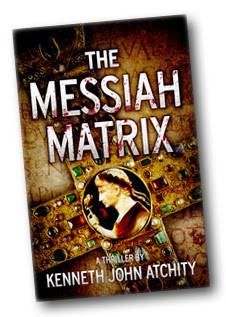 A renowned scholar-monsignor is killed in Rome while a Roman coin is
A renowned scholar-monsignor is killed in Rome while a Roman coin is
recovered from a wreck off the coast of ancient Judea. It’s up to his
young American protégé–a Jesuit priest–and a vivacious, brilliant
archaeologist to connect these seemingly disparate events and unravel
the tapestry that conceals in plain view the greatest mystery in the
ecclesiastical world. Together they pursue their passion for truth—while
fighting to control their passion for each other. What they uncover is
an ancient Roman imperial stratagem so controversial the Curia fears it
could undermine the very foundations of the Roman Catholic faith–much
like the secrets emerging from the Vatican in today’s news.
From the ancient port of Caesarea to Rome’s legendary catacombs and
the sacred caves of Cumae, this contemporary novel follows their
exhilarating quest to uncover the truth about the historical existence
of the real “Christian Savior.”
A truly packed novel working an an alternative premiss to the
Christian holy trinity. When Monsignor Isaac is gunned down his work and
research seem to be the only clues left behind to explain why as Emily
and Father Ryan join forces to unearth what he discovered and bring his
findings to light.
This novel asks the question what if? Not as glitzy as the Da Vinci code but thought provoking.
Amazon UK
Amazon US
Description
To what lengths would the Vatican go to suppress the secret origins
of its power? Current papal politics has made this thriller eerily
prophetic! The Messiah Matrix is a myth-shattering novel whose
protagonists delve into the secrets of the past—and expose the
fundamentalists who hide them still.
 A renowned scholar-monsignor is killed in Rome while a Roman coin is
A renowned scholar-monsignor is killed in Rome while a Roman coin is recovered from a wreck off the coast of ancient Judea. It’s up to his
young American protégé–a Jesuit priest–and a vivacious, brilliant
archaeologist to connect these seemingly disparate events and unravel
the tapestry that conceals in plain view the greatest mystery in the
ecclesiastical world. Together they pursue their passion for truth—while
fighting to control their passion for each other. What they uncover is
an ancient Roman imperial stratagem so controversial the Curia fears it
could undermine the very foundations of the Roman Catholic faith–much
like the secrets emerging from the Vatican in today’s news.
From the ancient port of Caesarea to Rome’s legendary catacombs and
the sacred caves of Cumae, this contemporary novel follows their
exhilarating quest to uncover the truth about the historical existence
of the real “Christian Savior.”

Published on July 02, 2013 00:00
July 1, 2013
Story Merchant Books - June's Top Ten Bestsellers
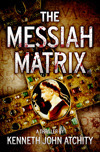
The Messiah Matrix
by Kenneth John Atchity
A gold coin reveals the true origins of Christianity.


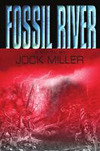
Fossil River
by Jock Miller
Prehistoric predators threaten the U.S. economy.



Writing Treatments to Sell
by Chi-Li Wong & Ken Atchity


So Help Me God
by Larry D. Thompson
An abortion gone wrong pits church against state.

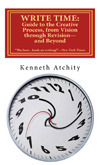
Write Time: Guide to the Creative Process, from Vision through Revision—and Beyond
by Kenneth Atchity

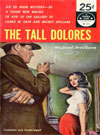
The Tall Dolores
by Michael Avallone
An Amazon Stripper, Diamonds and death

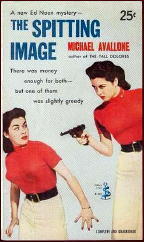
The Spitting Image
by Michael Avallone
You know you still alive if it's costin' you money.

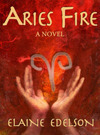
Aries Fire
by Elaine Edelson
She flees for her life & discovers her identity.



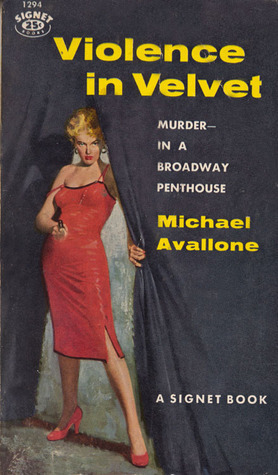
Violence in Velvet
by Michael Avallone

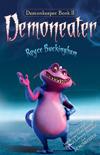
Demoneater
by Royce Buckingham
Can teens stop monsters from eating Seattle?


Published on July 01, 2013 14:41
Second Glace Reviews Story Merchant's Dennis M. Walsh's Nobody Walks!
All It Takes For Evil To Triumph Is For Good People To Stand By And Do Nothing!
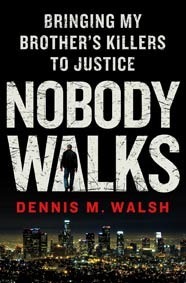 Synopsis:
Synopsis:
In 2003, Christopher Walsh was found stuffed in a
trash barrel in a storage locker in Van Nuys, California. After the dilatory
murder investigation took seven months to file charges, and more than four
years to go to trial, Dennis Walsh knew it was up to him to keep his little
brother’s murder from becoming a cold case.
The only son of a large Irish American family to
stay on the straight and narrow, Dennis found his family’s dubious background
paired with his law degree placed him in the unique position to finish the job
the cops couldn’t. Fencing with the police and the DA’s office, Dennis spent
years slinking between his life as a stand-up lawyer and hitting the streets to
try to convince the dopers, thieves, prostitutes, porn stars, and jail birds
that populated Christopher’s world to come forward and cooperate with the
police. Yet he walked a fine line with his harsh tactics; prosecutors
continuously told him he was jeopardizing not only the case, but his life.
Staying on the right side of the law to hunt down
these murderers put every part of Dennis to the test and it wasn’t long before
the brother who went clean knew he’d have to get his hands dirty. But 100
arrests later, the murders are in jail for life.
My Review:
The title for this article could have been an
alternative title for Nobody Walks: Bringing My Brother’s Killers To Justice
by Dennis M. Walsh. This was a heart-wrenching true story of the journey to
bring the killers of Christopher John Walsh to justice. Dennis Walsh, a
criminal defense and civil litigation attorney, spends four and a half years
making sure that the wheels of justice turn on this case. That is a long time
and I believe we all know or should know that the wheels of justice may turn at
a snail’s pace especially when one is patiently waiting for a killer or killers
to be punished.
As I stated this is a true story and there are times
when the reader believes that there may never be an end to this story. The end
does come; but not before one finds out just what Christopher Walsh went
through before finally being put out of his misery. Throughout this story one
gets the sense that Christopher may have had his faults and may not have always
operated on the right side of the law, but as one reads the story one also
realizes that no one deserves to be murdered in this fashion. The reader also
comes to a sense that many friends of Christopher may not have actually been
his friends. They stand around and do nothing as this murder and events
afterward play out.
Nobody Walks is a heart-wrenching story and as I
read it there were many times I was hoping for a revenge ending and not
necessarily an ending of killers being brought to justice. This was shocking
for me because I do believe that when one commits murder or some other type of
violent crime there needs to be legal punishment.
This was a great read, although there were times
when it did seem to drag I still enjoyed Nobody
Walks: Bringing My Brother’s Killers To
Justice by Dennis M. Walsh. After some thought; I have decided to give this
book a rating of 4****.
 Synopsis:
Synopsis:In 2003, Christopher Walsh was found stuffed in a
trash barrel in a storage locker in Van Nuys, California. After the dilatory
murder investigation took seven months to file charges, and more than four
years to go to trial, Dennis Walsh knew it was up to him to keep his little
brother’s murder from becoming a cold case.
The only son of a large Irish American family to
stay on the straight and narrow, Dennis found his family’s dubious background
paired with his law degree placed him in the unique position to finish the job
the cops couldn’t. Fencing with the police and the DA’s office, Dennis spent
years slinking between his life as a stand-up lawyer and hitting the streets to
try to convince the dopers, thieves, prostitutes, porn stars, and jail birds
that populated Christopher’s world to come forward and cooperate with the
police. Yet he walked a fine line with his harsh tactics; prosecutors
continuously told him he was jeopardizing not only the case, but his life.
Staying on the right side of the law to hunt down
these murderers put every part of Dennis to the test and it wasn’t long before
the brother who went clean knew he’d have to get his hands dirty. But 100
arrests later, the murders are in jail for life.
My Review:
The title for this article could have been an
alternative title for Nobody Walks: Bringing My Brother’s Killers To Justice
by Dennis M. Walsh. This was a heart-wrenching true story of the journey to
bring the killers of Christopher John Walsh to justice. Dennis Walsh, a
criminal defense and civil litigation attorney, spends four and a half years
making sure that the wheels of justice turn on this case. That is a long time
and I believe we all know or should know that the wheels of justice may turn at
a snail’s pace especially when one is patiently waiting for a killer or killers
to be punished.
As I stated this is a true story and there are times
when the reader believes that there may never be an end to this story. The end
does come; but not before one finds out just what Christopher Walsh went
through before finally being put out of his misery. Throughout this story one
gets the sense that Christopher may have had his faults and may not have always
operated on the right side of the law, but as one reads the story one also
realizes that no one deserves to be murdered in this fashion. The reader also
comes to a sense that many friends of Christopher may not have actually been
his friends. They stand around and do nothing as this murder and events
afterward play out.
Nobody Walks is a heart-wrenching story and as I
read it there were many times I was hoping for a revenge ending and not
necessarily an ending of killers being brought to justice. This was shocking
for me because I do believe that when one commits murder or some other type of
violent crime there needs to be legal punishment.
This was a great read, although there were times
when it did seem to drag I still enjoyed Nobody
Walks: Bringing My Brother’s Killers To
Justice by Dennis M. Walsh. After some thought; I have decided to give this
book a rating of 4****.

Published on July 01, 2013 00:00




